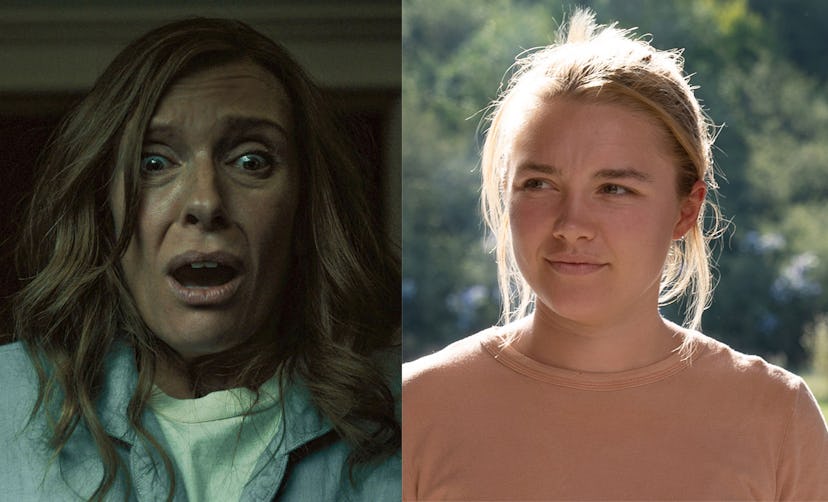Midsommar vs. Hereditary: Which One Is More Terrifying?

By now, you’ve probably read quite a bit about the commotion surrounding Midsommar, Ari Aster’s sophomore feature film about a group of grad school students who head to rural Sweden for a disastrous Midsummer tradition.
After making quite a splash (and making quite a few audience members feel sick enough to actually leave theaters) with Hereditary, Aster has followed up with Midsommar, an intriguing contribution to the “folk horror” genre. Aster has recently reached “auteur” status with his films, which means both of his projects will inevitably be placed in conversation with one another as much as they will be elevated to the conversation of how they stack up with other horror movies by other filmmakers. In some ways the two films are diametrically opposed—Hereditary takes place in the shadows of the home, Midsommar is most disturbing when horrors are revealed in the brightest of light—but they tackle the same themes of dealing with family tragedy and salvaging relationships.
That all begs the question, then: which one is scarier? Whether you are trying to decide if you have what it takes to sit through one or the other, or if you’ve already seen both and are having trouble parsing through your thoughts on which one frightened you more, we are seeing how the two stack up against one another by taking hallmarks of the horror genre—including gore, jump scares, occult rituals or supernatural occurrences, scream queens, and moments of levity intended to fleetingly distract the audience from the terrors that will unfold throughout the film—and rating them accordingly.
Before we get started, let’s take a look at both of the trailers. A good horror film trailer should ideally give you a taste of what to expect without giving away all of the plot details. It should also scare you a little bit, but not so much to the point where you are too scared to go and actually see the movie.
So, which one of these looks more terrifying? Aster himself has said that Midsommar is “less overtly a horror movie, but it’s still working in that same space,” and sees the film as an addition to the “folk horror” sub-genre (which includes movies like The Wicker Man and The Blood on Satan’s Claw). Based on the trailers, we can establish that while Hereditary is largely a family drama about the inability to escape the traits that are passed down from generation to generation, Midsommar is kind of a break-up horror-comedy, which follows an American couple, played by Florence Pugh and Jack Reynor who experience a hallucinogenic, ritualistic nightmare instead of a traditional, harmless Swedish fete. Midsommar wins this round.
And just a note, read no further if you fear spoilers for both films.
Gore
HEREDITARY, Milly Shapiro, 2018. /© A24 /Courtesy Everett Collection
There is one particularly bloody scene in Midsommar, which comes in the form of a ritual that requires two elders to commit suicide by jumping off a cliff in front of the entire commune. Hereditary is not so bloody, but there is a decapitation and immolation to look out for when watching the movie. The human body is graphically mutilated in both of these films, but the scope of which the body sustains harm is wider in Hereditary.
Jump Scares
HEREDITARY, Alex Wolff, 2018. /© A24 /Courtesy Everett Collection
Hereditary isn’t exactly heavy on the jump scares, but it certainly utilizes them more effectively than Midsommar, which only implements two small ones that aren’t that frightening compared to the rest of the queasy terrors introduced to the audience.
Rituals
DSCF8772.RAF
It’s Paimon vs. the Pagans, and both of them are terrifying in these films. But for all of the demonic possession going on in Hereditary, the eery Hårgas of Midsommar are possibly more deranged.
Scream Queens
HEREDITARY, Toni Collette, 2018. ph: Reid Chavis /© A24 /Courtesy Everett Collection
Hollywood has a bit of an issue when it comes to taking horror films seriously. (For example, Get Out could be described as a “social thriller,” which apparently goes down smoother with Academy voters.) But it’s safe to say that Toni Collette was snubbed during awards season because her performance as a grieving daughter and mother in Hereditary. Does she scream? Yes, she sure does. She shrieks a lot, and it is not only frightening but also somehow cathartic to watch her yell, “I am your mother” at her (also grieving) teen son (played by Alex Wolff). Florence Pugh’s performance is more subdued, or measured, and her character seems to remain on the verge of a panic attack at all times. She doesn’t shriek nearly as much as Collette, though.
Comic Relief
MDSMR_08-22-18_MW_01471.dng
A good horror film needs to give its audience at least one moment to breathe, and that usually comes in the form of comic relief. In Hereditary, not much is funny, other than Toni Collette’s character’s imminent art gallery deadline (which may actually be one of the scarier parts of the movie if we’re being honest). In Midsommar, Will Poulter puts in the work as the horny, ignorant American who taunts his friend for hanging on to a dying relationship and also pees on a sacred tree. He’s serving court jester realness, and it works.
The bottom line is, if you’re looking for a movie that will shake you in a more traditional way, Hereditary is your answer. If you want something that will make you feel physically ill, and also make you laugh about the silliness of being trapped in a dying relationship, Midsommar is the one for you.
Related: Midsommar First Reviews: It’s a Break-up Horror Comedy That Lives Up to the Hype